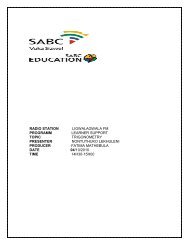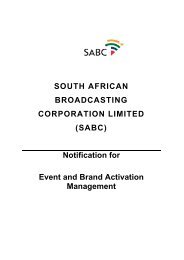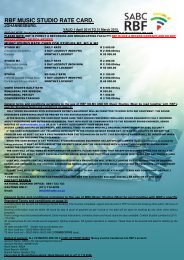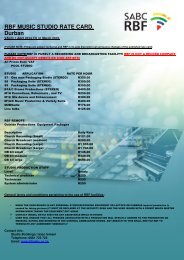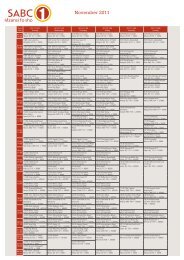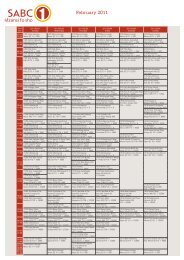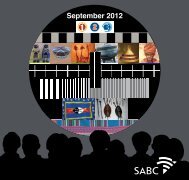About the SABC
About the SABC
About the SABC
- No tags were found...
Create successful ePaper yourself
Turn your PDF publications into a flip-book with our unique Google optimized e-Paper software.
<strong>SABC</strong> Staff.55<strong>the</strong> number of interns takenfor training and practicalwork in <strong>the</strong> Newsdepartment<strong>SABC</strong> Staff.The project will also assist in identifying <strong>the</strong> scarce skills that <strong>the</strong><strong>SABC</strong> and <strong>the</strong> industry require.REMUNERATION AND REWARDDuring <strong>the</strong> year under review, HCS also implemented a holisticremuneration and benefits strategy which included:★ The implementation of a retention strategy, including skillstransfer.★ The approval of <strong>the</strong> Restraint of Trade Policy framework.★ The cascading of <strong>the</strong> <strong>SABC</strong>’s revitalised performancemanagement-linked incentive scheme to include middlemanagement.EMPLOYEE WELLNESSIn 2008, <strong>the</strong> <strong>SABC</strong>’s Employee Wellness Unit focused onstreng<strong>the</strong>ning its service offering in partnership with OccupationalCare South Africa (“OCSA”). The following core services wereprovided: Wellness, Employee Assistance Programme (“EAP”),Primary Health Care (PHC) and Occupational Health Care (“OHC”).Statistical evidence indicates that of <strong>the</strong> total clinic attendance,1078 visits were for EAP, 3 441 for PHC and 592 for OHC.The year under review revealed a remarkable increase in <strong>the</strong> useof wellness services and in particular, voluntary counselling andtesting for HIV and Aids increased exponentially.A total of 515 employees participated in <strong>the</strong> HIV in-houseprogramme. Of <strong>the</strong> 515 participants, 60.3% participated involuntary counselling and testing (“VCT”) whilst 39.7% receivedcounselling only, as <strong>the</strong>y indicated that <strong>the</strong>y were not ready tobe tested. Of <strong>the</strong> 60.3% who participated in voluntary counsellingand testing (VCT), 7.39% tested positive for HIV. HIV contributedto high absenteeism largely due to opportunist diseases as well asto a loss of skills as we noted deaths related to HIV at <strong>the</strong> <strong>SABC</strong>.EMPLOYEE RELATIONSThe 2008/09 fiscal was a challenging year as far as <strong>the</strong> <strong>SABC</strong>’srelations with its workforce were concerned. This was as a resultof <strong>the</strong> implementation of transformational projects like SAP andDigital Terrestrial Television.The highlight of <strong>the</strong> year was <strong>the</strong> conclusion of <strong>the</strong> multi-termsalary agreement. Programmes geared at promoting goodemployment relations were also implemented in conjunction with<strong>the</strong> Organisational Development (“OD”) Unit.ORGANISATIONAL DEVELOPMENT (OD)The following was achieved by OD during <strong>the</strong> year under review:★ Employment Equity: The <strong>SABC</strong> Disability Strategy and Guidelineswere developed in line with <strong>the</strong> UN Charter of People withDisabilities. The implementation of <strong>the</strong> strategy focused on <strong>the</strong>education and <strong>the</strong> sensitisation of <strong>the</strong> workforce on <strong>the</strong> strategyin order to ensure a more disability-friendly environment anda better understanding of <strong>the</strong> needs of people with disabilities.1.95% of <strong>SABC</strong> staff are people with disabilities.★ Sexual Harassment: Also undertaken was a review of <strong>the</strong>organisation’s Sexual Harassment Policy to ensure <strong>the</strong>understanding of rights and complaints processes by allemployees.★ Performance Management: To ensure <strong>the</strong> <strong>SABC</strong>’s effectivefulfillment of its mandate, <strong>the</strong> new revitalised PerformanceManagement System was successfully linked to an incentivescheme and extended to middle managers as well. Previously,only Executives were beneficiaries of this scheme. A process isunderway to align individual performance with organisationalperformance as outlined in <strong>the</strong> <strong>SABC</strong>’s Corporate Plan.STAFF RETENTIONCompetition for broadcasting industry skills intensified during<strong>the</strong> year under review, with skilled presenters and broadcastengineers being lost to competitors. At <strong>the</strong> same time, it proveddifficult to attract skills in <strong>the</strong> areas of broadcast engineering,TVOB, Economic desk editors and reporters, executive producers,IT and assignment editors.A key aspect of <strong>the</strong> <strong>SABC</strong>’s strategy to remain competitive is toretain scarce and critical skills. This is particularly important as<strong>the</strong> emergence of new players has raised <strong>the</strong> premium attachedto highly sought-after skills.One of <strong>the</strong> key initiatives to retain critical skills within <strong>the</strong> <strong>SABC</strong>has been a large-scale project to identify and categorise <strong>the</strong><strong>SABC</strong>’s skills. This initiative was also integrated into <strong>the</strong> retentionstrategy. The management of independent contractors however,continues to be a challenge, but a project is under way toreclassify and categorise <strong>the</strong> independent contractors in line withlegislation and specific <strong>SABC</strong> business requirements.<strong>SABC</strong> Annual Report 2008 / 200981



